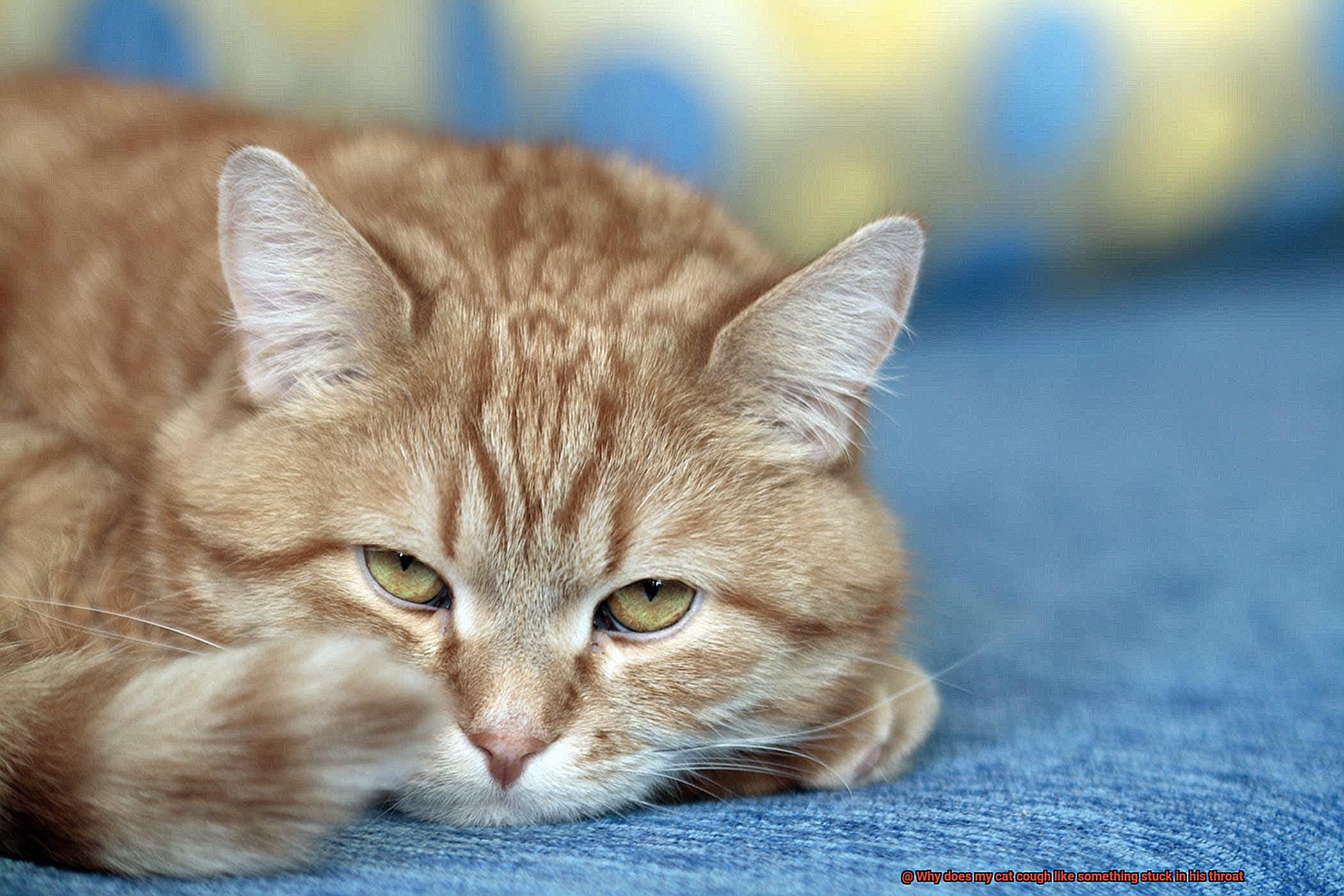Have you ever been startled awake by the sound of your cat coughing like they’re trying to dislodge something from their throat? As a devoted feline parent, it’s natural to feel concerned and curious about what might be causing this unsettling behavior. Luckily, there are several reasons why cats cough in this way, and each one requires different attention and treatment.
One possible culprit for your cat’s hacking is hairballs. Cats are fastidious groomers, but all that licking can lead to hair buildup in their stomachs. When a hairball becomes too large to pass through the digestive tract, your cat may start coughing as a way of trying to expel it.
But hairballs aren’t the only potential cause of feline coughing fits. Respiratory issues like asthma or bronchitis can also trigger bouts of coughing. These conditions inflame and irritate your cat’s airways, which can make them feel like something is stuck in their throat.
Other possible causes of coughing in cats include heart disease, allergies, or foreign objects lodged in their throats. Whatever the underlying reason may be, it’s important to get your kitty checked out by a veterinarian if they’re experiencing persistent or severe coughing.

In this post, we’ll explore the various reasons why your cat may be coughing like they have something stuck in their throat and offer tips on how to help them find relief. Whether you’re an experienced cat owner or a newbie learning the ropes, keep reading to discover what could be making your furry friend hack away and how you can ease their discomfort.

What Causes Hairballs in Cats?

Well, it all starts with their meticulous grooming habits. Cats love to keep themselves clean, but as they groom themselves, they also ingest a lot of loose hair. This hair accumulates in their digestive system and eventually forms a hairball in their stomach or intestines.
Unfortunately, hairballs can cause discomfort and irritation for your cat, leading to coughing and gagging. In some cases, hairballs can even cause vomiting, constipation, and intestinal blockages that can be life-threatening if not treated promptly.
Certain factors can increase the likelihood of hairball formation in cats. Long-haired breeds like Persians and Maine Coons tend to be more susceptible to hairballs than short-haired breeds. Additionally, cats that shed excessively or have skin conditions that cause excessive grooming may develop more hairballs.
Fortunately, there are ways to prevent hairballs from forming in the first place. Regular brushing and grooming of your cat can help prevent the buildup of loose hair. You can also offer your cat special diets, such as hairball control food that contains fiber to help move hair through their digestive system.

Remember, if you notice any concerning symptoms or changes in your cat’s behavior, it’s important to seek veterinary care immediately. In some cases, hairballs can lead to serious health issues that require medical attention.
Respiratory Infections and Allergies
However, respiratory infections and allergies are common culprits behind this behavior. Let’s explore these conditions in more detail and learn how to distinguish between them.
Respiratory infections can be bacterial, viral, or fungal in nature and can affect either the upper or lower respiratory tract. Upper respiratory infections are more common and often present symptoms such as sneezing, runny nose, and coughing. Lower respiratory infections, on the other hand, can cause wheezing, difficulty breathing, and lethargy. If your cat exhibits additional symptoms like a runny nose or seems less active than usual, it might suggest that they have a respiratory infection.
Allergies occur when your cat’s immune system overreacts to an otherwise harmless substance. Dust mites, pollen, mold spores, and certain foods are the most common allergens for cats. When exposed to these allergens, your cat’s body releases histamines that cause inflammation and irritation in their respiratory tract, resulting in coughing. If you notice that your cat’s cough is more frequent during certain times of the year or after exposure to specific substances, they may have allergies.

Differentiating between respiratory infections and allergies can be tricky since they share similar symptoms. Therefore, it’s essential to take your cat to a veterinarian for proper diagnosis and treatment. A veterinarian will conduct a thorough examination of your furry friend and may recommend some tests to determine the root cause of their cough.
Treatment options for respiratory infections depend on the type of infection and may include antibiotics or antifungal medication. In cases of allergies, medications such as antihistamines or corticosteroids can help alleviate symptoms. Lifestyle changes such as using air purifiers or switching to hypoallergenic cat food may also be necessary in some instances.
Foreign Objects Stuck in the Throat
One of the most common causes of coughing in cats is foreign objects getting stuck in their throat. These objects can range from small toys and hair ties to bones and even strings. Curiosity may have killed the cat, but in this case, it’s just causing them discomfort and irritation.
Foreign objects stuck in the throat can be potentially life-threatening, especially if they obstruct the airway. If you notice that your cat is experiencing difficulty breathing, excessive drooling, or vomiting, seek immediate veterinary care. The sooner you act, the better the chances of a positive outcome.
In some cases, cats may be able to cough up the foreign object on their own. However, if the object is too large or lodged deep in the throat, veterinary intervention may be necessary. Your veterinarian may need to use an endoscope or other specialized tools to remove the object safely.
Preventing foreign objects from getting stuck in your cat’s throat should be a top priority for every cat owner. Keep small objects out of their reach and supervise them during playtime to ensure they don’t ingest anything harmful. Avoid giving them bones or other items that can easily break into sharp pieces that may become lodged in their throat.
Asthma and Heart Disease
However, it can be distressing when they develop medical conditions that may cause them discomfort and even put their lives at risk. Two such conditions are asthma and heart disease, which can also cause coughing in cats. In this blog post, we’ll delve into the connection between these two ailments and explore ways to prevent them.
Asthma is a chronic respiratory disease that causes inflammation and narrowing of the airways, making it difficult for cats to breathe. This can lead to coughing, wheezing, and shortness of breath. Cats with asthma may struggle during physical activity and even cough up foamy mucus. On the other hand, heart disease can also cause coughing in cats by leading to fluid buildup in their lungs. The fluid obstructs normal breathing and triggers a reflex cough in felines. Heart disease may also cause rapid breathing, lethargy, and poor appetite.
If you suspect that your cat is suffering from asthma or heart disease, it is crucial to take them to the vet immediately for proper diagnosis and treatment. Your vet may prescribe medications such as bronchodilators or anti-inflammatory drugs for asthma or diuretics for heart disease to eliminate excess fluid from the lungs.
Prevention is always better than cure. One way to prevent these conditions from developing is by maintaining your cat’s healthy weight. An overweight cat is more susceptible to both asthma and heart disease. Additionally, regular exercise can help keep your cat healthy and reduce their risk of developing these conditions.
Keeping your cat’s living area clean and free of dust and allergens is another way to prevent respiratory issues like asthma. Regular checkups with the vet can also help detect any potential health issues before they become serious.
Symptoms to Look Out For
When your cat starts coughing like there’s something stuck in their throat, it can be tough to know what to do. That’s why it’s crucial to keep an eye out for some key symptoms that can help you determine if it’s a minor issue or something more serious.
One sign to look for is retching or gagging without producing anything. This could mean your cat is dealing with a hairball or has a foreign object lodged in their throat. Another symptom to watch for is persistent coughing that lasts for more than a few days. This could indicate a respiratory infection or asthma.
However, not all cats exhibit obvious symptoms when they’re coughing like something is stuck in their throat. That’s why it’s essential to look out for other signs as well, such as difficulty breathing or wheezing, lethargy, loss of appetite, and weight loss. These symptoms could be indicative of more severe health issues such as heartworm disease or lung cancer.
Taking note of any changes in your cat’s behavior and health is critical, and consulting with your trusted veterinarian is always a smart move if you notice any of these symptoms. Regular check-ups with your veterinarian are also essential to ensure your cat’s overall well-being.
When to Seek Veterinary Care
Part of that responsibility is being vigilant about their health. If you notice your cat coughing, don’t brush it off as something trivial. Instead, take action and seek veterinary care if necessary.
While coughing every so often can be normal, persistent coughing could indicate a more serious problem. It could mean your cat has an underlying respiratory condition or even a foreign object lodged in their throat. To be safe, monitor your cat’s behavior closely and take note of any unusual symptoms.
If you notice your cat struggling to breathe, has a blue or pale tongue, or is drooling excessively, don’t hesitate to seek emergency veterinary care immediately. These symptoms could indicate a life-threatening condition that requires immediate medical attention.
Suppose your cat’s coughing persists for more than a few days. In that case, it’s time to schedule an appointment with your veterinarian. Your vet will be able to examine your cat and determine if there is an underlying medical issue causing the coughing.
It’s also important to know that some cats may have allergies or asthma, which can cause coughing. If your cat has a history of these conditions, it’s even more crucial to seek veterinary care if you notice persistent coughing.
8V3Tntu2BEo” >
Also Read: Why Does My Cat Choke Himself?
Conclusion
To sum it up, if you hear your cat coughing as if they have something stuck in their throat, it’s crucial to take notice and act promptly. Although hairballs are a common culprit for coughing in felines, other respiratory issues like asthma or bronchitis can also trigger bouts of coughing. Allergies, heart disease, and foreign objects lodged in their throats are some other possible causes you should be aware of.
Prevention is always better than cure when it comes to your cat’s health. Regular grooming and brushing can help prevent hairball formation, while maintaining a healthy weight and regular exercise can reduce the risk of developing asthma or heart disease. Keeping your cat’s living area clean and free of dust and allergens is also crucial to keep them healthy.
It’s vital to keep an eye out for symptoms such as persistent coughing that lasts for more than a few days, difficulty breathing or wheezing, lethargy, loss of appetite, and weight loss. If you notice any concerning symptoms or changes in your cat’s behavior, seek veterinary care immediately.
Remember that being a responsible pet owner involves being vigilant about your cat’s health. Regular check-ups with your veterinarian are essential to ensure your feline friend’s overall well-being.







